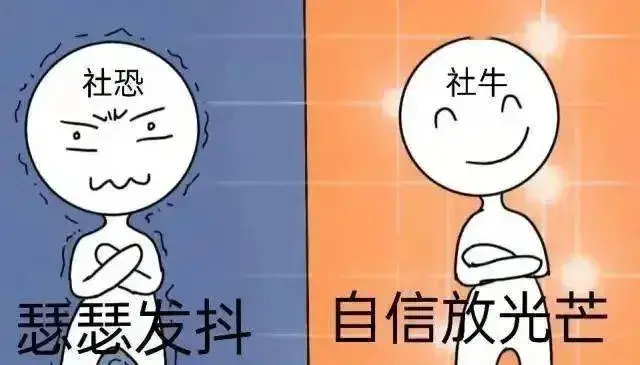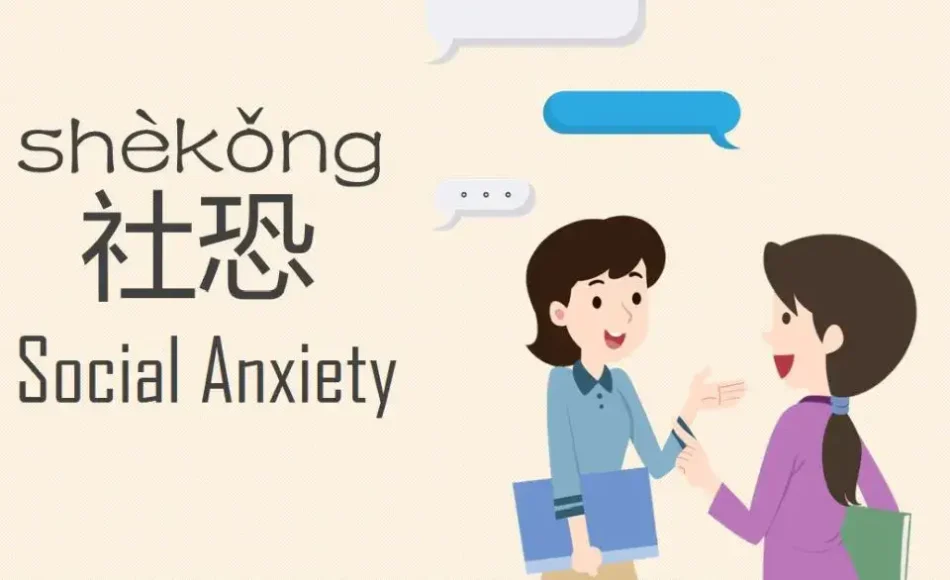Extroverts and introverts are universal personality types, but the way they are expressed and valued varies greatly across cultures. In China, shaped by collectivism, Confucian traditions, and rapid modernization, these traits take on unique meanings. Modern slang has given these traits new labels: 社牛 (shè niú) and 社恐 (shè kǒng). The term she niu, literally “social cow”, uses niu in its slang sense of “awesome” or “powerful”. A she niu person is socially fearless, confident, and quick to connect with others, which is the classic extrovert who thrives in groups and enjoys attention. On the other side, she kong is short for shejiao kongjuzheng, or “social anxiety disorder”. While it refers to a clinical term, in casual usage it describes being shy, introverted, or socially awkward. Someone might jokingly call themselves she kong when they avoid parties, hesitate to speak in class, or feel uncomfortable around strangers.
These expressions have become popular online because they capture real experiences in a lighthearted, relatable way. A she niu might share bold, outgoing content on Douyin or Weibo, while a she kong may stick to quiet WeChat chats with close friends. Both terms resonate especially with younger generations, who balance traditional expectations of modesty with modern pressures to be expressive, confident, and visible.
Altogether, the contrast between introverts and extroverts in China, or between she kong and she niu, shows how personality is shaped not only by psychology but also by cultural values and social change. Introversion has long aligned with traditions of modesty and restraint, while extroversion is increasingly celebrated in the fast-paced, globalized world of contemporary China. Both personality types, and both slang terms, capture the diverse ways Chinese people navigate social life today.

According to data from the NERIS Type Explorer, China ranks as one of the most introverted countries, with approximately 50.07% of individuals identifying as introverts. China’s cultural landscape has long emphasized harmony, modesty, and social order, which naturally favor introverted qualities. Quietness, humility, and deference to others are often seen as virtues, while boldness or self-assertion may be interpreted as arrogance. Extroverts, however, also have a place, particularly as urbanization and globalization change the way people interact and succeed in both personal and professional life.
In social situations, introverts often find comfort in smaller circles of family and close friends. They may express themselves indirectly, preferring subtle gestures or actions over overt statements. This aligns with the broader cultural preference for maintaining face (mianzi) and avoiding open conflict. Extroverts, on the other hand, thrive in larger gatherings, parties, and community events. They are often more willing to speak their mind or initiate conversations with strangers, which can make them highly effective in networking. Yet in traditional settings, being too outspoken may risk being seen as disruptive or self-serving, requiring extroverts to strike a balance between their natural tendencies and cultural expectations.
In the workplace, introverts are often appreciated for their reliability, ability to focus, and skill in working quietly behind the scenes. They tend to excel in roles that require patience, analysis, and long-term concentration, such as research and academia, engineering, finance and accounting, creative and artistic fields, and administrative work. Extroverts bring different strengths, often thriving in leadership positions, sales and marketing, education and training, tourism, customer service and PR, or any role that involves negotiation and public interaction. Their ability to build guanxi, the personal and professional relationships central to Chinese business culture, gives them an edge in navigating the complex web of connections that influence career success. While introverts may sometimes be slower to expand their networks, their reputation for loyalty and dependability can also foster deep and lasting professional relationships.
Education in China provides another lens for understanding how these traits are perceived. Traditionally, classrooms rewarded quiet attentiveness, respect for teachers, and the ability to absorb knowledge without challenging authority, which are the qualities that play to the strengths of introverts. However, in recent decades, reforms have encouraged participation, debate, and presentations, placing more emphasis on students’ ability to express themselves clearly. This shift allows extroverts to thrive, especially in international schools and universities that prepare students for global opportunities. Yet even within these settings, the cultural expectation of modesty remains strong, and students are encouraged to balance confidence with humility.
Self-expression is another area where the contrast between introverts and extroverts is evident. Introverts in China often reflect Confucian ideals of restraint, modesty, and self-discipline, avoiding unnecessary displays of individuality. Extroverts, particularly in cosmopolitan cities like Shanghai, Beijing, and Shenzhen, are increasingly comfortable adopting Western-influenced habits of openness, directness, and self-promotion. Social media platforms such as WeChat, Douyin, and Weibo provide new spaces for extroverted personalities to flourish, while introverts may use the same platforms in quieter ways, focusing on maintaining close connections rather than building large public followings.
The generational divide also plays a role. Older generations, raised under stricter social norms and a collectivist mindset, tend to value introversion more highly, associating it with respect and discipline. Younger Chinese, growing up in a rapidly globalizing society, are often more accepting of extroversion, seeing it as a strength in career development and personal branding. Urban youth, especially those exposed to Western media, increasingly admire confidence, humor, and individuality, which are traits often associated with extroverts.
A study analyzing data from 29,810 Chinese adults found that higher levels of extraversion were associated with lower levels of depressive symptoms. This suggests that extraversion may have positive psychological correlates in the Chinese context. Another study highlighted that men tend to score higher on traits such as extroversion, openness, and emotional stability, than women, especially in workplace settings. However, it’s important to note that these findings are based on specific studies and may not represent the entire population of China.
Overall, introversion has long been more compatible with China’s cultural traditions. But as the country modernizes, extroverts are finding greater opportunities to leverage their sociability, communication skills, and leadership potential. Both personality types continue to play important roles in shaping Chinese society. Introverts bring stability, thoughtfulness, and depth, while extroverts contribute energy, connectivity, and vision. In today’s China, where tradition and modernity coexist, both have their own paths to recognition and success.








